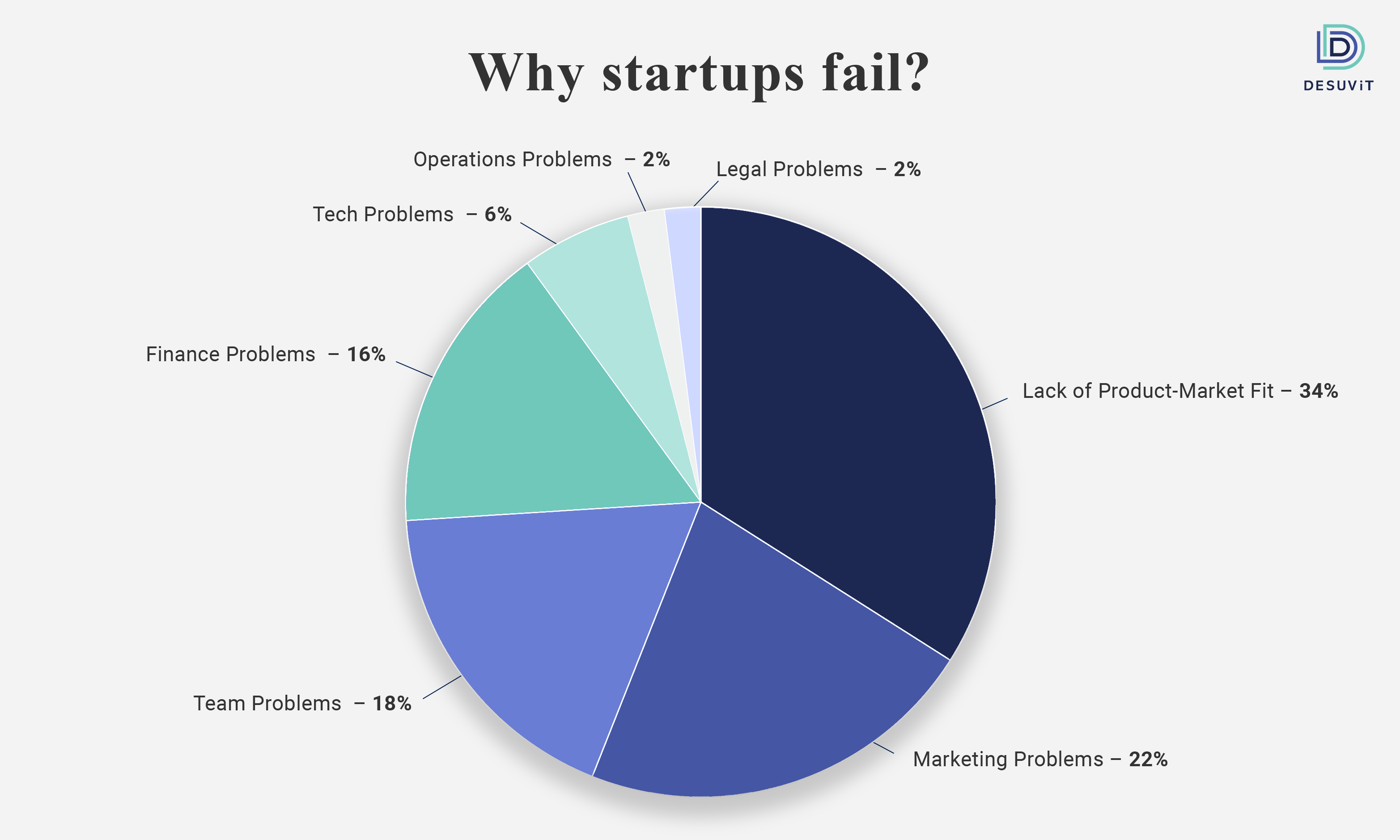Did you know 90% of startups fail within their initial three years? A good business idea does not guarantee success and many startups are proof of that.
A visionary entrepreneur will recognize this reoccurring issue and get a jumpstart on how to avoid it. To crack the code for a successful startup, you do not need to come up with just a product idea. It is about creating long-term solutions that build upon this idea.
The best way to succeed is to learn from others’ failures. Scroll down to see the common reasons behind startup failure and how you can avoid them.
10 Reasons Behind A Failing Startup Idea
A startup is essentially a business experiment that is prone to failure in its early stages. Failory, a content site for startup founders, interviewed more than 80 startups to learn why they failed. Here are some common problems that startups have faced. Let’s dive deeper into the specifics of some of these problems!
1. Lack Of Market Research
The typical story of an entrepreneur starts with an idea for a business that would make their own lives easier. However, before getting caught up in the innovation, you need to make sure you have the majority’s support.
Your product’s aim should be to solve an obvious pain point among the majority of the market. When you are not solving a significant problem, you immediately fail in the long-term scalability goal that every startup needs to achieve. You risk investing all your resources into an insignificant idea, to begin with.
Here, you see entrepreneurs failing to focus on the most critical thing – whether the product is correct or not. There are also instances where the market timing is wrong. In such cases, the product idea is good but presents itself to a market that is not yet ready for such a solution.
The Fix
The importance of market research here cannot be ignored.
- Do your research on the specific industry while you are still in the idea stage.
- Identify and define the buyer persona you wish to engage.
- Gather a focus group and prepare questions to gain in-depth insight into the market.
- You can also conduct online market research surveys with tools like Survey Monkey.
2. Inefficient Business Model
Business models represent the lifeline of every business. The model determines how your startup will make money and gain lifetime value.
In the startup world, many entrepreneurs make the mistake of being too optimistic about their exciting products. They tend to overlook the business model, thinking that customers will pave their own way to reach your product.
This may work out in the early stage when you are attracting a small number of customers. However, as your startup gets older, it will become an increasingly costly challenge to acquire customers. For instance, staying dependent on a single channel to attract customers will not help you capitalize on the early traction gained.
The result of a flawed business model – cost to acquire customers (CAC) becomes higher than customers’ lifetime value (LTV).
flawed.
The Fix
Right from the start, your business model should be guided by the two rules mentioned below. These rules will also help you arrive at a realistic estimate of your sales cycle and return on investment.
- LTV should be significantly higher than CAC.
- To achieve a capital-efficient business, your CAC should be recovered in less than 12 months.
3. Lacking Marketing Strategy
Certain tech-savvy entrepreneurs have run into problems when they are too invested in building their products. They lose sight of other essential factors like a marketing or customer acquisition strategy.
Just take a look at Kettleball Kitchen, a meal-kit startup that shut down its services in 2019. Despite its multi-million pound evaluation, it got no opportunity to profit against rivals like HelloFresh and BlueApron. That’s because these two startups cleverly partnered with social media influencers to reach new audiences.
Kettleball Kitchen failed to take out the time to get to know its target audience. As a result, the company was not aware of what viable channels they can use to attract the audience’s attention.
The Fix
One thing is clear – you need to develop a strong marketing strategy right from the get-go. A modern digital marketing plan is your priority.
- Avoid casting a wide net and stick to a niche audience at first.
- Develop a social media presence for your brand.
- Attend trade shows and networking events to build a potential list of customers.
- Study your competitors to see how they market their products.
- Use KPI tools like Google Analytics to measure the engagement and check if your strategies are working.
4. Overbuilding The Product
In an effort to make their product stand out, startups move further away from creating the MVP. The MVP or minimum viable product is a technique used to roll out products with basic features.
When you launch a feature-rich product, the user adoption rate remains low and stagnant. Moreover, it takes time and money to build such products. So recovering your investment becomes ever more challenging. Even Facebook started simply before introducing features such as the “timeline.”
The Fix
If anything you can learn from Facebook’s success story, it is to keep things simple.
- UX and engineering should be given the same priority in product development.
- When you are creating a technological product, ensure the learning curve for your audience is minimal.
- Focus on keeping the interface easy to use.
5. Poor Management Team
As you can tell, a management team is seen as the brains of the company. A weak or inexperienced management team can affect the productivity of the entire startup.
Weak management is characterized by the inability to make decisions and communicate clearly with employees. Lack of communication and decisiveness leads to issues with the product itself. It might not get launched on time, or the idea may not support extensive market research.
Such a management team will also be unwilling to work with people due to their own biases. As a result, they will build teams that weaken the internal structure of the organization. So poor management teams have a domino effect on the entire startup, leading to overall poor execution.
The Fix
There should be a clear organizational structure to your startup with managers that have some fundamental management ability.
- Communicate within the teams as much as possible.
- Delegate tasks to the appropriate team members.
- Show strong leadership with strategic decisions backed by reliable data.
- Provide employees with constructive criticism for the growth of both employees and the company.

Source: Failory.com
6. Incompatible Team Members
Behind every successful startup is a team of like-minded people. Creating a business from the ground up is a stressful task that can bring out many emotions. As a result, things can get ugly if emotions get out of hand and result in conflicts.
The disharmony gets worse when your team members disagree on the long-term goals. You will be busy putting out fires every day instead of solidifying an actionable strategy to launch your business.
The Fix
When building a team, do not build it with the mindset that it is for a startup. Instead, build it with your business’s long-term vision in mind.
The ideal team will be made up of employees who have a passion for your idea and agree with the goals. At the same time, each should differ in their specialization and bring something new to the table. This will help in balancing out the dynamics of the team.
To help the teams get familiar with each other, organize activities and ice-breaking sessions. Tools like Trello, Slack, and Zoom make collaboration more manageable, allowing your team to thrive.
7. Insufficient Cash Flow
Another reason startups fail is because they struggle to keep the cash flow positive. Running a business means paying employees and clearing your bills.
Sometimes entrepreneurs get caught up in the branding game, investing a whole lot in marketing. The money may also be spent on improving the product. As you do this, you may forget to keep a detailed record of your account and expenditure.
Being aware of your funds is highly crucial, especially when external investors fund your startup. If you fail to think through your expenses, you will witness low ROIs that sink your startup.
The Fix
Before officially launching your startup, you need to identify the sources and uses of your funds.
- Explore all your funding options and secure funds well in advance.
- Go to networking events to meet with different investors.
- Regularly track your account expenses to analyze how long your company can run with the given cash flow.
- If you are looking for a new round of funding, track your key performance indicators or KPIs to show investors.
8. Loss Of Focus
As already mentioned, startup founders are idea-oriented individuals who tend to get carried away with great ideas. In the business world, this mentality can lead to distractions and a general loss of focus.
To build on the momentum they gain early on, some startups decide to expand their offerings. They take on too many distractive projects too soon. Entrepreneurs also move further away from the big picture while they micromanage several new projects.
Customers notice this and end their relationship with the startup. The inability to retain current customers ultimately causes the startup’s demise.
The Fix
If you get too ambitious right from the start, you will lose focus on the important stuff.
- Look to solve the apparent pain problems first with your product.
- Keep a healthy balance between personal and work life.
- Streamline trivial tasks with tools like LastPass and Hootsuite.
- Before taking on a new project or product launch, thoroughly research it as a source of revenue.
9. Failure To Adapt
If you fall in love with the solutions you are providing, you fail to pivot when the customers tell you otherwise. Customers’ needs evolve with changing times, and so should you.
For instance, think of Google. It provided a solution for arranging information and giving easy access to people around the world. What started mainly as a simple online directory has transformed into an intelligent search engine today. Wedded to the same old idea will only hurt you more and leave you frustrated with the lack of growth.
The Fix
Pivoting should be seen as a way to adapt and grow instead of a threat. To modify your startup idea if it is not attracting the target audience. There is nothing wrong with building a new vision for your startup.
- Get customer feedback to understand what are their new needs.
- Take a customer-centric approach when developing new products.
10. Legal Obstacles
As you grow and reach new heights, your startup can end up facing a world of legal complexities. This is a common issue among startups, as entrepreneurs lack expert knowledge of corporate law. Every area and industry vary in their laws. If you are not aware of these, you can head down the path of spending all your funds on court settlements.
The Fix
Even if you have read up on the laws, make sure to get a legal team’s expert advice. They can tell you the best way to go about your startup that does not challenge a law.
Summing It Up
There is no single formula for success. However, taking a look at past mistakes made by startups can give you insight into why startups succeed and fail.
Budding entrepreneurs also need feedback and advice on how to get their startups off the ground. So, do not be afraid to ask for help from industry experts. These experts can give you the constructive feedback needed to gauge the right direction for your startup.
If you are looking for solutions to help build your startup, reach out to a software development company like Desuvit. At Desuvit, we provide the necessary solutions to help your business grow with automated workflow. Contact us today and let us know your startup needs.
Desuvit is a Norway-born software development company delivering Custom Software Development, Mobile Apps, and Web Applications Development for various verticals and business domains. We offer end-to-end solutions for companies with no software or IT division, Startups, and companies that need to scale their software development efforts but lack the expertise required. We help our clients in growing their businesses so we can grow with them. Some of the technologies we work with: .Net, Azure, Microservices, Azure functions(Serverless computing), React Native, Flutter, React JS, TypeScript, Angular, NServiceBus, Azure Service Bus, Azure Queues, SQL Service, MySQL, Cosmos DB, etc.
Enjoyed this article? Subscribe for more valuable and great content !
By subscribing, you agree with our privacy policy and our terms of service.





